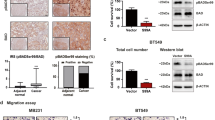Abstract
In this article we describe the preclinical characterization of 5-(3-chlorophenylamino) benzo[c][2,6]naphthyridine-8-carboxylic acid (CX-4945), the first orally available small molecule inhibitor of protein CK2 in clinical trials for cancer. CX-4945 was optimized as an ATP-competitive inhibitor of the CK2 holoenzyme (Ki = 0.38 nM). Iterative synthesis and screening of analogs, guided by molecular modeling, led to the discovery of orally available CX-4945. CK2 promotes signaling in the Akt pathway and CX-4945 suppresses the phosphorylation of Akt as well as other key downstream mediators of the pathway such as p21. CX-4945 induced apoptosis and caused cell cycle arrest in cancer cells in vitro. CX-4945 exhibited a dose-dependent antitumor activity in a xenograft model of PC3 prostate cancer model and was well tolerated. In vivo time-dependent reduction in the phosphorylation of the biomarker p21 at T145 was observed by immunohistochemistry. Inhibition of the newly validated CK2 target by CX-4945 represents a fresh therapeutic strategy for cancer.





Similar content being viewed by others
Abbreviations
- IQA:
-
[5-oxo-5,6-dihydroindolo-(1,2-a)quinazolin-7-yl]acetic acid
- PI3K:
-
Phosphatidylinositol-3-kinase
- Akt:
-
v-akt murine thymoma viral oncogene homolog
- PARP:
-
Poly(ADP-ribose) polymerase
- LCMS:
-
Liquid chromatography mass spectrometry
- NMR:
-
Nuclear magnetic resonance
References
Zhang J, Yang PL, Gray NS (2009) Targeting cancer with small molecule kinase inhibitors. Nat Rev Cancer 9:28–39
Solimini NL, Luo J, Elledge SJ (2007) Non-oncogene addiction and the stress phenotype of cancer cells. Cell 130:986–988
Luo J, Solimini NL, Elledge SJ (2009) Principles of cancer therapy oncogene and non-oncogene addiction. Cell 136:823–837
Ruzzene M, Pinna LA (2010) Addiction to protein kinase CK2: a common denominator of diverse cancer cells? Biochim Biophys Acta 1804:499–504
Wang G, Unger G, Ahmad KA, Slaton JW, Ahmed K (2005) Downregulation of CK2 induces apoptosis in cancer cells—a potential approach to cancer therapy. Mol Cell Biochem 274:77–84
Slaton JW, Unger GM, Sloper DT, Davis AT, Ahmed K (2004) Induction of apoptosis by antisense CK2 in human prostate cancer xenograft model. Mol Cancer Res 2:712–721
Trembley JH, Chen Z, Unger G, Slaton J, Kren BT, Van Waes C, Ahmed K (2010) Emergence of protein kinase CK2 as a key target in cancer therapy. Biofactors 36:187–195
Pagano MA, Bain J, Kazimierczuk Z, Sarno S, Ruzzene M, Di Maira G, Elliott M, Orzeszko A, Cozza G, Meggio F, Pinna LA (2008) The selectivity of inhibitors of protein kinase CK2. An update. Biochem J 415:353–365
Prudent R, Moucadel V, Nguyen C-H, Barette C, Schmidt F, Florent J-C, Lafanechere L, Sautel CF, Duchemin-Pelletier E, Spreux E, Filhol O, Reiser J-B, Cochet C (2010) Antitumor activity of pyridocarbazole and benzopyridoindole derivatives that inhibit protein kinase CK2. Cancer Res 70:9865–9874
Sandholt IS, Olsen BB, Guerra B, Issinger OG (2009) Resorufin a lead for a new protein kinase CK2 inhibitor. Anticancer Drugs 20:238–248
Najda-Bernatowicz A, Lebska M, Orzeszko A, Kopanska K, Krzywinska E, Muszynska G, Bretner M (2009) Synthesis of new analogs of benzotriazole, benzimidazole and phthalimide-potential inhibitors of human protein kinase CK2. Bioorg Med Chem 17:1573–1578
Cozza G, Bortolato A, Moro S (2009) How druggable is protein kinase CK2? Med Res Rev 30:419–462
Sarno S, Ruzzene M, Frascella P, Pagano MA, Meggio F, Zambon A, Mazzorana M, Di Maira G, Lucchini V, Pinna LA (2005) Development and exploitation of CK2 inhibitors. Mol Cell Biochem 274:69–76
Zhu D, Hensel J, Hilgraf R, Abbasian M, Pornillos O, Deyanat-Yazdi G, Hua XH, Cox S (2010) Inhibition of protein kinase CK2 expression and activity blocks tumor cell growth. Mol Cell Biochem 333:159–167
Prudent R, Cochet C (2009) New protein kinase CK2 inhibitors: jumping out of the catalytic box. Chem Biol 16:112–120
Pierre F, Chua PC, O’Brien SE, Siddiqui-Jain A, Bourbon P, Haddach M, Michaux J, Nagasawa J, Schwaebe MK, Stefan E, Vialettes A, Whitten JP, Chen TK, Darjania L, Stansfield R, Anderes K, Bliesath J, Drygin D, Ho C, Omori M, Proffitt C, Streiner N, Trent K, Rice WG, Ryckman DM (2011) Discovery and SAR of 5-(3-chlorophenylamino)benzo[c][2,6]naphthyridine-8-carboxylic acid (CX-4945), the first clinical stage inhibitor of protein kinase CK2 for the treatment of cancer. J Med Chem 54(2):635–654
Vangrevelinghe E, Zimmermann K, Schoepfer J, Portmann R, Fabbro D, Furet P (2003) Discovery of a potent and selective protein kinase CK2 inhibitor by high-throughput docking. J Med Chem 46:2656–2662
Sarno S, de Moliner E, Ruzzene M, Pagano MA, Battistutta R, Bain J, Fabbro D, Schoepfer J, Elliott M, Furet P, Meggio F, Zanotti G, Pinna LA (2003) Biochemical and three-dimensional-structural study of the specific inhibition of protein kinase CK2 by [5-oxo-5,6-dihydroindolo-(1,2-a)quinazolin-7-yl]acetic acid (IQA). Biochem J 374:639–646
Ferguson AD, Sheth PR, Basso AD, Paliwal S, Gray K, Fischmann TO, Le HV (2011) Structural basis of CX-4945 binding to human protein kinase CK2. FEBS Lett 585(1):104–110
Siddiqui-Jain A, Drygin D, Streiner N, Chua PC, Pierre F, O’Brien SE, Bliesath J, Omori M, Ho C, Proffitt C, Schwaebe MK, Ryckman DM, Rice WG, Anderes K (2010) CX-4945, an orally bioavailable selective inhibitor of protein kinase CK2, inhibits prosurvival and angiogenic signaling and exhibits antitumor efficacy. Cancer Res 70:10288–10297
Padgett CS, Lim JKC, Marschke RF, Northfelt DW, Andreopoulou E, Von Hoff DD, Anderes K, Ryckman DM, Chen TK and O’Brien SE (2010) Clinical pharmacokinetics and pharmacodynamics of CX-4945, a novel inhibitor of protein kinase CK2: interim report from the phase 1 clinical trial. In: 22nd EORTC-NCI-AACR symposium on “molecular targets and cancer therapeutics”, Berlin
Author information
Authors and Affiliations
Corresponding authors
Rights and permissions
About this article
Cite this article
Pierre, F., Chua, P.C., O’Brien, S.E. et al. Pre-clinical characterization of CX-4945, a potent and selective small molecule inhibitor of CK2 for the treatment of cancer. Mol Cell Biochem 356, 37–43 (2011). https://doi.org/10.1007/s11010-011-0956-5
Received:
Accepted:
Published:
Issue Date:
DOI: https://doi.org/10.1007/s11010-011-0956-5




